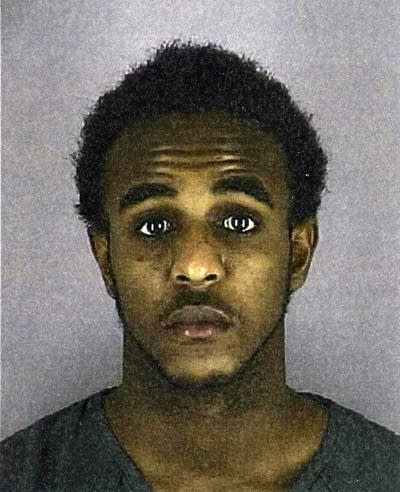Court hears closing arguments in triple murder trial

Jurors are deliberating in the case of Mahdi Hassan Ali, the accused killer of three men in the Seward Market in Minneapolis last year.
Ali faces two counts of murder for each of the men he's accused of killing: one count of first degree, premeditated murder and one count of murder in the first degree while committing or attempting to commit aggravated robbery.
Hennepin County Judge Peter Cahill instructed jurors that they have three options for each charge: They can find Ali guilty of first degree murder; guilty of second degree murder; or, not guilty.
Attorneys presented their closing arguments in front of a packed courtroom, full of mostly Somali and other east African immigrants.
Create a More Connected Minnesota
MPR News is your trusted resource for the news you need. With your support, MPR News brings accessible, courageous journalism and authentic conversation to everyone - free of paywalls and barriers. Your gift makes a difference.
In his closing argument lasting an hour-and-a-half, Assistant Hennepin County Attorney Robert Streitz reviewed evidence presented during the trial. He showed graphic crime scene photos of the three victims. One particularly bloody photo elicited an audible gasp from a woman in the courtroom. Streitz also replayed the store's security camera video of the masked gunman. The court heard recordings of 911 calls from witnesses and audio from police interviews in which Ali tells investigators multiple versions of where he was on the day of the shootings.
Streitz said Ali entered the store with the intent to get money. He said Ali brought a loaded, semi automatic gun with him as insurance, in case something went wrong. Something did go wrong. Streitz said not only did customer Anwar Mohammed walk in and interrupt the robbery, but the men working behind the counter recognized Ali. Streitz said Ali killed the men to keep them from identifying him to police. Streitz said Ali even returned to the store to kill store employee Osman Elmi.
"He chased Elmi down like he was a dog," Streitz said. Ali's actions were premeditated and intentional, he said.
Defense attorney Fred Goetz offered a competing narrative to jurors. In his closing argument, Goetz said the people who testified to having personal knowledge of Ali's involvement in the shootings were not trustworthy.
Ahmed Ali is the admitted accomplice to the robbery who reached a plea agreement with prosecutors in exchange for his testimony against Mahdi Ali.
Goetz called the arrangement a "sweetheart deal," because without the agreement, Ahmed Ali faced life in prison without parole. With the deal, he faces 18 years in prison, and could be eligible for release in 12 years. Goetz accused Ahmed Ali of lying in order to protect his younger cousin, Abdisalon Ali. Goetz said Abdisalon was the gunman in the store and that Mahdi Ali remained outside. Goetz alleged that Ahmed and Abdisalon are trying to frame Mahdi.
Mahdi Ali is not related to Ahmed or Abdisalon Ali.
Abdisalon Ali was briefly arrested by police and questioned but never charged with any crimes related to the robbery.
Another witness, Leandro Garcia, was locked up with Mahdi Ali in the Carver County jail for a period last year. Garcia testified that while he was in jail Ali confessed to him that he committed the killings. Goetz dismissed Garcia as a "jailhouse snitch." He said Garcia is trying to ingratiate himself with law enforcement authorities through his cooperation. However, Garcia, who has been convicted of three felonies, testified that he did not make a deal with prosecutors in exchange for his testimony. Goetz said Garcia may have never even talked to Mahdi Ali while the two were in jail, because Garcia continually referred to the defendant as 'Ma-ha-di.'
The state also presented DNA evidence connecting Mahdi Ali to the Seward Market on the night of the shootings. A forensic scientist from the Minnesota Bureau of Criminal Apprehension testified DNA from one of the victims was found on a pair of jeans from Mahdi Ali's apartment. The scientist said the probability of someone else unrelated to the victim sharing the same DNA profile was one in nearly 7 billion.
The odds of probability include only unrelated people, Goetz reminded jurors, and that it is possible that DNA from somebody related to the victim could have been transferred to Ali's jeans. He pointed out that scientists could not conclude how long the DNA had been on the pants, or if the DNA came from the victim's blood or saliva.
Goetz wrapped up his closing argument by saying the state failed to prove beyond a reasonable doubt that Mahdi Ali killed the three men. He said whoever killed the men in the store acted out of panic and not premeditation, because the shots were widely dispersed.
The prosecution rebutted Goetz's characterization with details from the Hennepin County Medical Examiner's report. Streitz said there were six spent bullet casings found at the scene and six wounds in the victims.
"They all hit the mark," Streitz said.
If found guilty on all counts, Ali will likely be sentenced to life in prison without parole. However, the defense attorney has already said he will call for a jury trial to determine Ali's actual age before the sentencing occurs. Goetz argues that Ali was 15 at the time of the shootings and should be tried as a juvenile.
